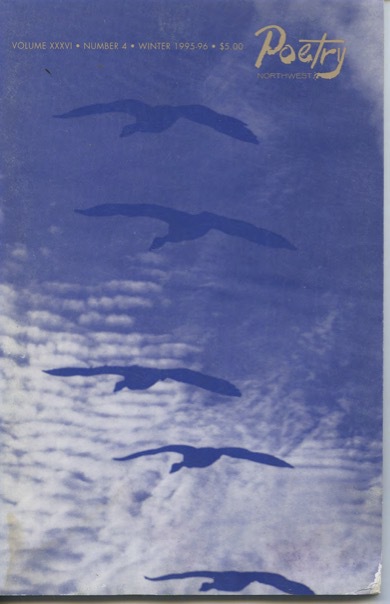Winterreise
This poem first appeared in the Winter 1995-96 version of Poetry Northwest.
This is the boy next door discovering
what he wants his voice to do—
that his lungs in the cold
and throat and teeth and tongue
can mirror alarm if he likes.
He fakes a bicycle crash on the ice,
jumps up, and yodels his imitation of a siren.
This is the red folder blown open in winter.
This is the street under a window.
Inside Schubert is at the piano,
singing Die Winterreise for the first time
to friends: “Never again will the leaves
be green at the window. Never again
will I hold my love in my arms.”
And they hate it.
This is Paul Klee’s Winterreise,
a portrait of the artist one-eyed,
caped and hooded at his mother’s grave.
This is Klee’s mother on the way to his studio.
This is Schubert in the November marigolds.
This is the boy outside my window
making the journey again and again
down his driveway, pedaling hard on the ice,
staging his accidental death,
rising and singing like an ambulance.
This is the white fog changing to yellow.
This is Klee’s mother after tea in his studio.
This is Schubert dying of syphilis.
This is Schubert singing to the crows:
“Krähe, crow, even if you want to leave me
don’t leave me. Don’t leave me.”
This is Ida Klee walking into Klee’s studio
after tea on the day she died.
Klee was in his chair, asleep.
Evergreens were on the horizon.
This is Ida Klee released from paralysis.
This is her ghost walking the studio
after tea, after she had died,
winking at her son as if it mattered—
that kind of message from the dead—
winking at Klee, who was not surprised,
who for the rest of his life took it seriously.
This is the folder blown open in winter.
A week later Johann Vogel sang
Die Winterreise to Schubert’s friends
and they listened
and loved it this time.
This is Vogel’s baritone in the marigolds,
the wondrous conduit of his throat
and mouth, diaphragm, teeth and lungs.
These are the crows who throw snow
at Schubert’s scorned lover
from every roof of every house in town.
There are accidents of the flesh;
there are the unbalanced lovers
we have been and still are.
Yesterday the twist of sunlight in a room
filled me with longing.
This is me putting on my coat,
walking downtown to sing
Christmas carols in the open square.
This is Klee painting himself from memory.
This is the boy who has been dying all day
hoarse and unrescueed, going in to supper.
I’ve driven by the same woman’s house
for 20 years remembering she kissed me.
This is me in the December marigolds.
These are her father’s fields blown full of snow.
—

